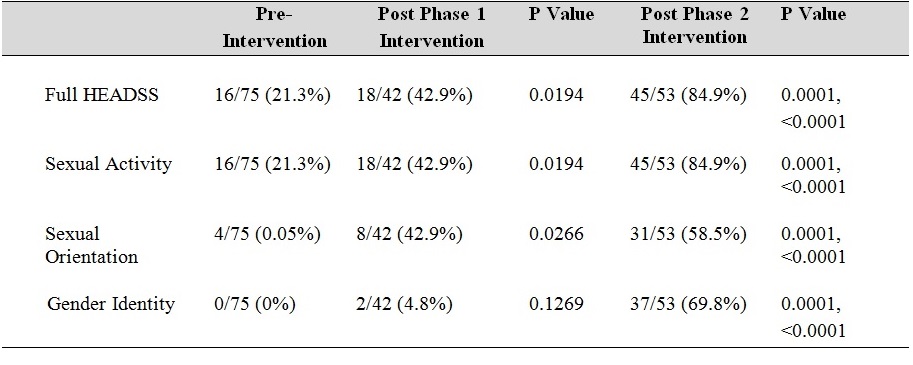Session Information
The 2020 Pediatric Rheumatology Symposium, originally scheduled for April 29 – May 2, was postponed due to COVID-19; therefore, abstracts were not presented as scheduled.
Date: Friday, May 1, 2020
Title: Poster Session 2
Session Type: ACR Abstract Session
Session Time: 5:00PM-6:00PM
Background/Purpose: Adolescence is an especially vulnerable time when many rheumatologic conditions first present for diagnosis and management. Adolescence brings unique challenges including those relating to body image, schooling, complexities of interpersonal relationships, compliance with medications, and independence with healthcare needs. Within this population, LGBTQ spectrum adolescents are a population with known health disparities and psychosocial stressors . It is of the utmost importance that providers for adolescent patients conduct appropriate psychosocial screenings to better identify these patients and address their unique healthcare needs. The HEADSS assessment (home, education/employment, activities, drugs, sexuality, suicide/depression) is a validated tool developed to provide a comprehensive psychosocial assessment of adolescent patients. Sexual orientation and gender identity (SOGI) screening can be incorporated within the HEADSS framework. We conducted a quality improvement (QI) project aimed to increase provider screening and appropriate documentation of SOGI data for adolescent patients seen for initial evaluation in pediatric rheumatology clinics at an academic medical center.
Methods: This QI initiative consisted of two phases: 1) a short lecture illustrating the components of the HEADSS assessment, highlighting the importance of SOGI screening, and discussing strategies to incorporate them into routine clinic visits and 2) an electronic note template to be utilized for HEADSS/SOGI documentation. Charts of all patients age 12 and older seen for initial evaluation in all pediatric rheumatology clinic were reviewed during a two month window prior to interventions and one month after Phases 1 and 2 for documentation of a full HEADSS assessment, sexual activity and health assessment, sexual orientation, and gender identity. Documentation of HEADSS assessment and SOGI information prior to and after each phase were compared using Fisher’s exact test. For all statistical analyses a two-tailed p-value < 0.05 was considered significant.
Results: Chart review included 75 patients pre- intervention for assessment of baseline information, 42 patients post- phase 1 intervention, and 53 patients post- phase 2 intervention (Table 1). There was a statistically significant increase in assessment of all measures in the period immediately following the interventions. The phase 2 intervention not only showed a statistically significant increase from the phase 1 intervention but also from baseline (Figure 1).
Conclusion: Provider education and introduction of an electronic note template greatly enhanced screening and documentation of SOGI data for adolescent patients seen in pediatric rheumatology clinics at an academic medical center. Further studies are needed to assess whether these findings are sustainable and reproducible between other centers.
To cite this abstract in AMA style:
Balmuri N, Spitznagle J, Adams A, Onel K, Taber S, Pan N. HEADSS and Shoulders, Knees and Toes: Improving Sexual Orientation and Gender Identity Screening in the Pediatric Rheumatology Clinic [abstract]. Arthritis Rheumatol. 2020; 72 (suppl 4). https://acrabstracts.org/abstract/headss-and-shoulders-knees-and-toes-improving-sexual-orientation-and-gender-identity-screening-in-the-pediatric-rheumatology-clinic/. Accessed .« Back to 2020 Pediatric Rheumatology Symposium
ACR Meeting Abstracts - https://acrabstracts.org/abstract/headss-and-shoulders-knees-and-toes-improving-sexual-orientation-and-gender-identity-screening-in-the-pediatric-rheumatology-clinic/


